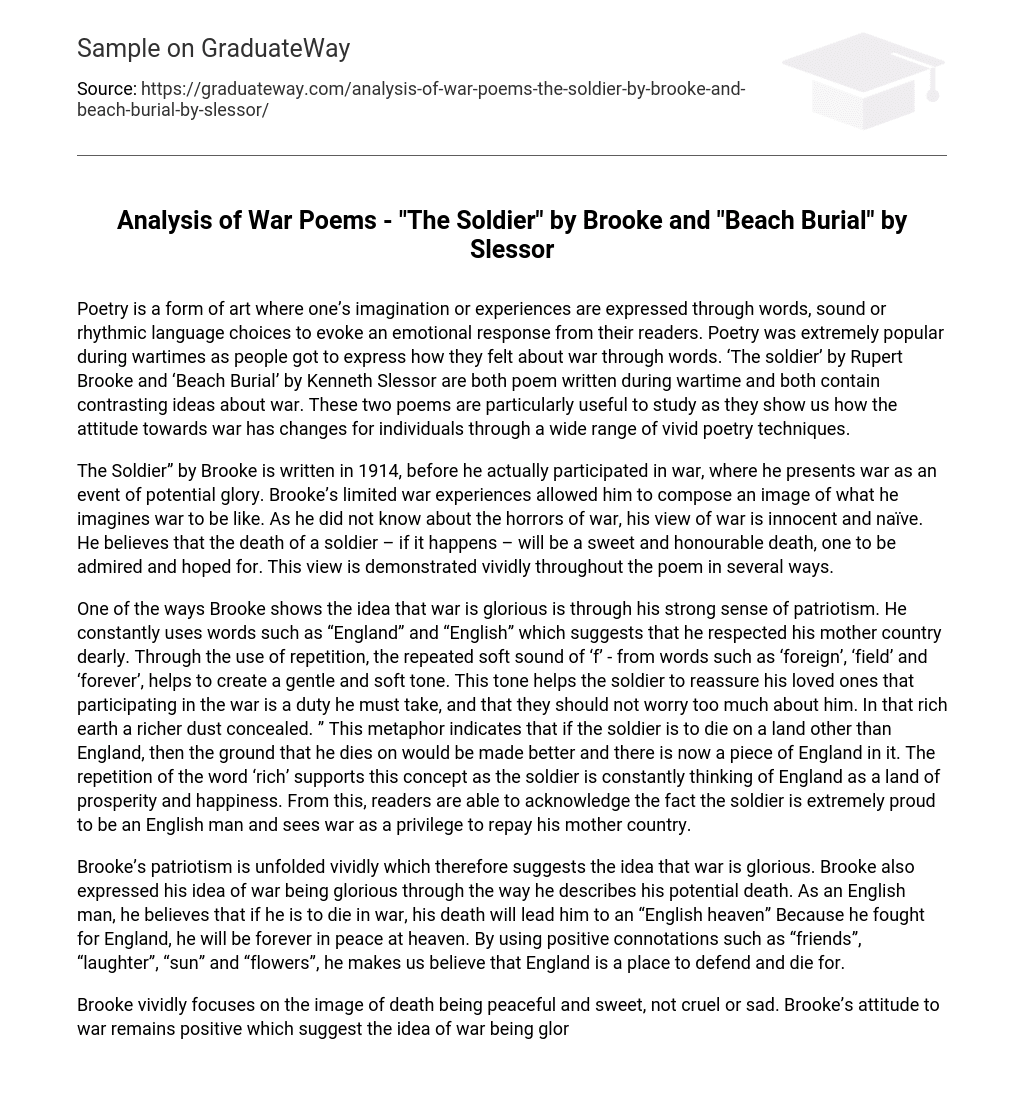Poetry is a form of artistic expression that utilizes words, sound, and rhythmic language choices to convey one’s imagination or personal experiences, aiming to elicit emotional responses from readers. Particularly during wartimes, poetry gained immense popularity as it provided individuals with a platform to convey their sentiments about war through written words. The poems ‘The soldier’ by Rupert Brooke and ‘Beach Burial’ by Kenneth Slessor, both composed during wartime, present disparate perspectives on war. These two poems are highly valuable for analysis as they demonstrate how individuals’ attitudes towards war have evolved over time, employing a variety of vivid poetry techniques.
” The Soldier” by Brooke was written in 1914, prior to his active involvement in war, and portrays war as a potentially glorious event. With his limited exposure to war, Brooke constructs an idealized depiction of what he imagines warfare to be. Lacking knowledge about the horrifying realities of war, his perspective on it remains innocent and naïve. He holds the belief that should a soldier die, it would be a noble and admirable death, one that should be admired and wished for. This perspective is vividly portrayed throughout the poem in various ways.
Brooke portrays the idea that war is glorious by expressing his strong sense of patriotism and deep respect for his mother country, England. He consistently uses the words “England” and “English” throughout his writing. Moreover, he employs repetition to create a soft and gentle tone, particularly with the repeated soft sound of ‘f’ in words like ‘foreign’, ‘field’, and ‘forever’. This tonal quality serves to reassure his loved ones that participating in the war is a duty he must fulfill, urging them not to worry excessively about him.
Furthermore, Brooke employs a metaphor stating, “In that rich earth a richer dust concealed.” This metaphor indicates that if a soldier were to die on foreign soil, that land would become enriched by his presence and contain a part of England within it. The frequent repetition of the word ‘rich’ reinforces this concept, highlighting the soldier’s strong association of England with prosperity and happiness. Through these elements, readers come to understand the soldier’s profound pride in being English and his perception of war as an opportunity to repay his beloved mother country.
Brooke’s portrayal of patriotism reveals the notion that war is a source of glory. His perspective on war’s grandeur is exemplified by his portrayal of potential death. As an Englishman, he firmly believes that if he were to perish in battle, he would find himself in an “English heaven.” By fighting for his country, he envisions eternal tranquility in heaven. Through the use of optimistic words like “friends,” “laughter,” “sun,” and “flowers,” Brooke persuades us to view England as a cause worth defending and sacrificing one’s life for.
Brooke emphasizes the serene and gentle nature of death, rejecting any notions of cruelty or sadness. He maintains a positive attitude towards war, suggesting its glorified nature. Conversely, Slessor’s “Beach Burial” is an anti-war poem that conveys the horrors of war and the loss of innocent lives. Unlike Brooke, Slessor did not serve as a soldier but instead worked as a war correspondent, witnessing the aftermath of war firsthand.
The perspective on war presented in “Beach Burial” is one of experience and realism, highlighting the profound change in attitude towards war after witnessing its horrific horrors. This poem does not glorify war or celebrate the return of heroes, but instead focuses on the tragic and harrowing burial of fallen soldiers. In the first stanza, Slessor describes the scene as ‘soft and humbly’, emphasizing the quiet and somber nature of the burial. However, as readers delve deeper, they come to realize that the persona is referring to a convoy of dead sailors.
Slessor employed rhyme to elicit a profound and emotive reaction. The rhyming pattern of ABCB serves to symbolize the ceaseless ocean waves depositing lifeless corpses onto the shore. By employing descriptive language and similes such as “as blue as dead men’s lips,” “bewildered pity,” and “the sob of the gunfire,” Slessor effectively conveyed his experiences through vivid and imaginative word choices, evoking an emotional response in readers. These concepts powerfully convey the notion that war is inherently detrimental.
Slessor has written about how soldiers in war lose their identity and the difficulty of giving them a respectful burial. The persona observed as the deceased soldiers were retrieved from the water and laid to rest in shallow graves near the ocean. Each cross bore the inscription “Unknown seaman” with a sense of bewilderment, their commitment to their country met with a pitiful demise. In contrast to Brooke’s poem, where patriotism is rewarded with an eternal rest in an “English heaven,” Slessor’s poem presents a perspective that portrays Brooke’s perception of death as misleading and incorrect.
In stanza 3, the use of personification is evident as the words are depicted as “choking” while trying to write the names of the deceased soldiers. This signifies the difficulty in acknowledging the vast number of unidentified lives lost. The phrase “ghostly pencil” further emphasizes this concept, portraying the pencil as a haunting presence for those responsible for deciding to engage in war. These ideas strongly convey the negative nature of war. Both poems extensively explore the shifts in attitude towards war.
By comparing the two poems, readers are able to observe the shifts in various individuals’ perspectives on war, as both inexperienced and realistic views are depicted. The figurative language employed in “The Soldier” romanticizes Brooke’s naive outlook on war, while Slessor’s use of emotive language in “Beach Burial” portrays war with sadness and despair. These two poems enhance our comprehension of how poetry can convey ideas and concepts by employing vivid and imaginative techniques.





